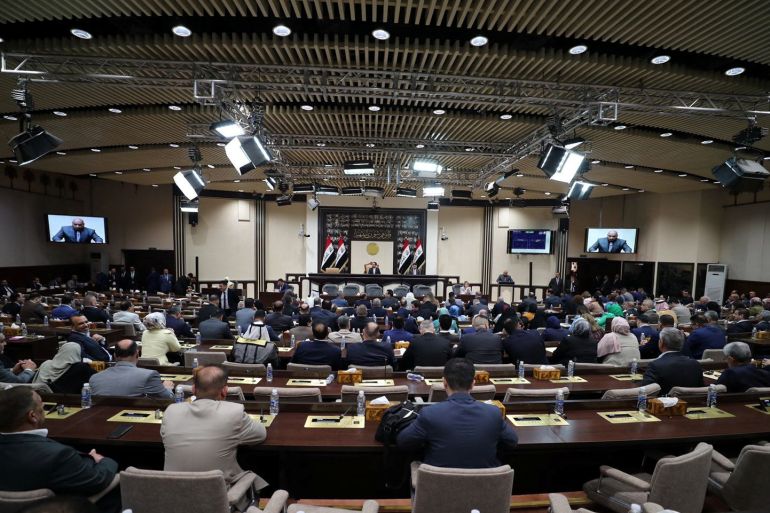Iraqi MPs to meet on Thursday to elect new president
Iraq has already made three failed attempts this year to elect a new head of state.

Iraq’s parliament will meet on Thursday to elect a new president, Speaker Mohammed al-Halbussi’s office said, in a surprise move seen as an attempt to end months of political deadlock.
Iraq has already made three failed attempts this year to elect a new head of state from February 7 to March 30.
Keep reading
list of 3 itemsArbaeen pilgrimage brings millions to Iraqi city of Karbala
Thousands of Iraqis gather to mark 2019 anti-government protest
Al-Halbussi’s office said on Tuesday – more than a year since the last general election – that the parliamentary session would have “a single item on the agenda, the election of the President of the Republic”.
Iraqis last voted on October 10, 2021, in a general election held early due to a wave of mass protests against corruption, rampant unemployment and decaying infrastructure.
Populist Shia Muslim leader Muqtada al-Sadr emerged as the biggest winner but failed to rally enough support to form a government.
Al-Sadr has withdrawn his 73 parliamentarians from the assembly and in August announced he would quit politics, prompting the worst violence in Baghdad for years. His loyalists stormed a government palace and fought rival Shia groups, most of whom are backed by Iran and have heavily armed paramilitary wings.
The religious leader had initially sought to form a parliamentary majority by allying himself with Kurdish and Sunni Muslim parties, excluding the Iran-backed Shia groups.
The presidency is a largely ceremonial position, but the vote for a new president is a key step in the political process because the president invites the nominee of the largest parliamentary bloc to form a government.
Under a power-sharing system designed to avoid sectarian conflict, Iraq’s president is Kurdish, its prime minister is Shia and its parliament speaker is Sunni.
Disagreement among the main Kurdish parties that run the semi-autonomous Kurdish region of northern Iraq has prevented the selection of a president.
The Patriotic Union of Kurdistan party (PUK) has held the presidency since 2003. Its rival, the Kurdistan Democratic Party (KDP), which claimed the largest number of Kurdish votes by far, is insisting on their own candidate.
A lawmaker from the KDP said no agreement with the PUK has been reached yet.
“Talks are still going on with the PUK and we need more time,” Mahma Khalil told the Reuters news agency. “No session should happen before we reach an agreement.”
“No agreement has been reached as of this moment, and it looks [like a] thorny issue,” senior PUK member Gayath al-Sorchi told Reuters.
Ahead of al-Halbussi’s announcement, the United Nations had urged political parties to end the deadlock, warning that “Iraq is running out of time”.
Iraq has raked in huge revenues from energy exports this year, and the central bank is holding a colossal $87bn in foreign exchange reserves.
However, the money remains locked up because caretaker Prime Minister Mustafa al-Kadhimi is not authorised to submit an annual state budget to parliament in his capacity as caretaker prime minister.
The UN said it is “imperative” that a budget is adopted before the end of the year.